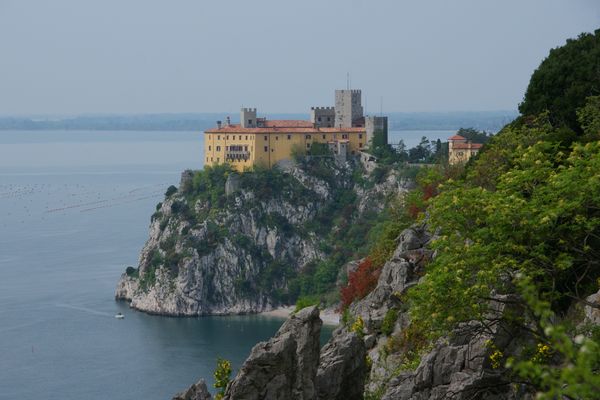This Slovenian border city blends Italian and Slovenian influences. It's near the Soca River, popular for water sports and autumn hiking in golden-hued hills.
Nova Gorica, a young Slovenian city on the Italian border, invites you to explore its unique character. Stand in two countries at once at Europe Square, marvel at the world's largest stone arch on Solkan Bridge, or visit the crypt of the last French Bourbon monarchs at Kostanjevica Monastery. The city's socialist-era buildings tell the story of its recent past, while the nearby Vipava Valley tempts you with local wines and cuisine. For those seeking adventure, the emerald Soča River and Julian Alps are just a short trip away.
Europe Square: A Cross-Border Public Space
At the heart of Nova Gorica lies Europe Square (Trg Evrope), a unique public space that straddles the Slovenian-Italian border. You can stand with one foot in each country, experiencing the unity between the two nations. The square, created in 2004 when Slovenia joined the European Union, is a venue for various cultural events and serves as a meeting point for locals and tourists alike.
Architectural Highlights
As you walk through Nova Gorica, you'll notice its distinct socialist-era architecture. The Municipal Palace displays revolutionary motifs, while the concrete France Bevk Library exemplifies the city's modernist design. For a contrast, visit the Renaissance Kostanjevica Monastery on a nearby hill. The monastery houses an extensive library and the crypt of the last French Bourbon monarchs.
Solkan Bridge: An Engineering Achievement
Just 3 km from the city center, in the village of Solkan, you'll find the Solkan Bridge. This railway bridge boasts the largest stone arch in the world, spanning 85 meters across the Soča River. From the bridge, you can see the emerald waters below and the surrounding landscape.
Cultural Institutions
Nova Gorica is home to one of Slovenia's three national theaters, where you can enjoy a variety of performances throughout the year. The Goriška Museum, located in Kromberk Castle, presents exhibits on the region's history. For current local culture, read the Razpotja cultural magazine, published in Nova Gorica.
Panovec Forest and Soča Valley
The Panovec Forest, covering 380 hectares on the outskirts of Nova Gorica, provides many options for walking, jogging, and cycling in nature. For more adventurous activities, head to the nearby Soča Valley, known for its water sports and hiking trails. You can also try bungee jumping, the only location in Slovenia where this activity is available.
Wine and Dine in Vipava Valley
A short drive east of Nova Gorica takes you to the Vipava Valley, one of Slovenia's premier wine regions. Here, you can taste indigenous grape varieties and enjoy traditional cuisine. Visit the Renaissance Zemono Manor House, home to the Michelin-starred restaurant Gostilna pri Lojzetu, for a high-quality dining experience.
Getting There and Around
You can reach Nova Gorica by train from Ljubljana, with regular connections via Jesenice. If you're coming from Italy, take a train to Gorizia station and then a short bus ride across the border. Within the city, local buses provide convenient transportation, including routes that cross into Gorizia, Italy.
Location and Founding
Nova Gorica sits on Slovenia's western border with Italy, just across from the Italian town of Gorizia. The city was established in 1948 as a planned settlement after World War II, when the Paris Peace Treaty left the Slovene part of the Gorizia region without its traditional center. Today, Nova Gorica forms part of a cross-border metropolitan area with Gorizia and Šempeter-Vrtojba.


















